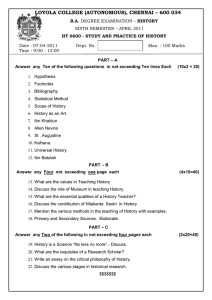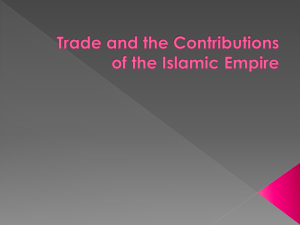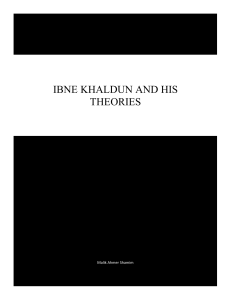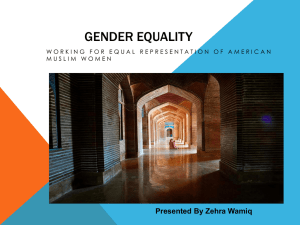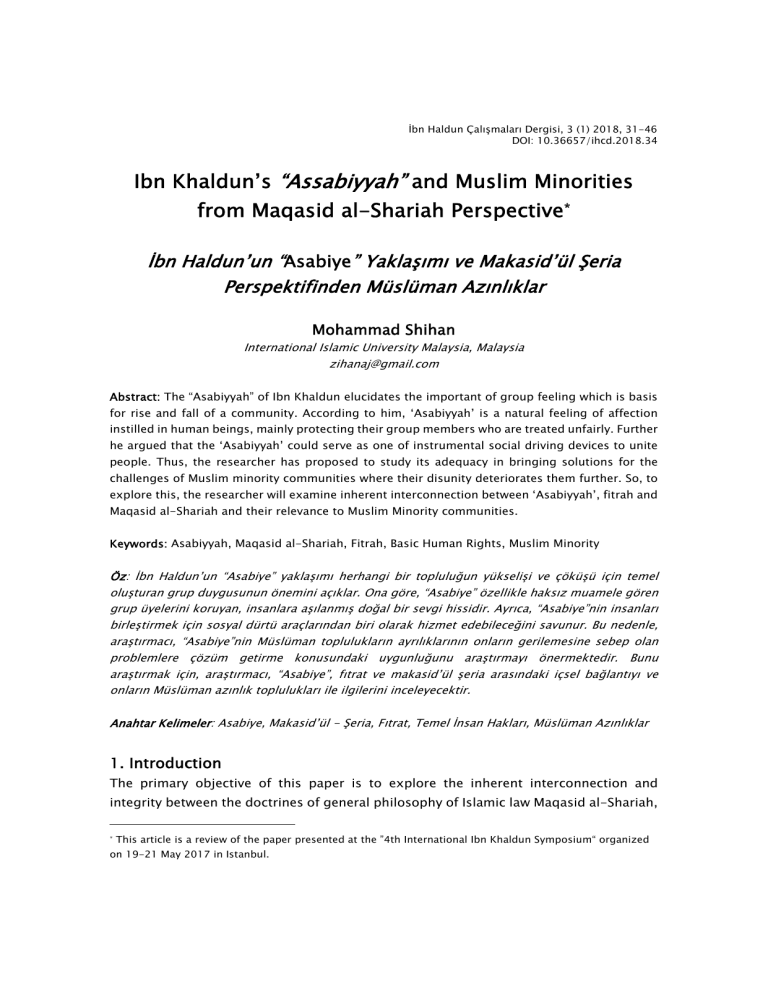
İbn Haldun Çalışmaları Dergisi, 3 (1) 2018, 31-46 DOI: 10.36657/ihcd.2018.34 Ibn Khaldun’s “Assabiyyah” and Muslim Minorities from Maqasid al-Shariah Perspective* İbn Haldun’un “Asabiye” Yaklaşımı ve Makasid’ül Şeria Perspektifinden Müslüman Azınlıklar Mohammad Shihan International Islamic University Malaysia, Malaysia zihanaj@gmail.com Abstract: The “Asabiyyah” of Ibn Khaldun elucidates the important of group feeling which is basis for rise and fall of a community. According to him, ‘Asabiyyah’ is a natural feeling of affection instilled in human beings, mainly protecting their group members who are treated unfairly. Further he argued that the ‘Asabiyyah’ could serve as one of instrumental social driving devices to unite people. Thus, the researcher has proposed to study its adequacy in bringing solutions for the challenges of Muslim minority communities where their disunity deteriorates them further. So, to explore this, the researcher will examine inherent interconnection between ‘Asabiyyah’, fitrah and Maqasid al-Shariah and their relevance to Muslim Minority communities. Keywords: Asabiyyah, Maqasid al-Shariah, Fitrah, Basic Human Rights, Muslim Minority Öz: İbn Haldun’un “Asabiye” yaklaşımı herhangi bir topluluğun yükselişi ve çöküşü için temel oluşturan grup duygusunun önemini açıklar. Ona göre, “Asabiye” özellikle haksız muamele gören grup üyelerini koruyan, insanlara aşılanmış doğal bir sevgi hissidir. Ayrıca, “Asabiye”nin insanları birleştirmek için sosyal dürtü araçlarından biri olarak hizmet edebileceğini savunur. Bu nedenle, araştırmacı, “Asabiye”nin Müslüman toplulukların ayrılıklarının onların gerilemesine sebep olan problemlere çözüm getirme konusundaki uygunluğunu araştırmayı önermektedir. Bunu araştırmak için, araştırmacı, “Asabiye”, fıtrat ve makasid’ül şeria arasındaki içsel bağlantıyı ve onların Müslüman azınlık toplulukları ile ilgilerini inceleyecektir. Anahtar Kelimeler: Asabiye, Makasid’ül - Şeria, Fıtrat, Temel İnsan Hakları, Müslüman Azınlıklar 1. Introduction The primary objective of this paper is to explore the inherent interconnection and integrity between the doctrines of general philosophy of Islamic law Maqasid al-Shariah, * This article is a review of the paper presented at the ”4th International Ibn Khaldun Symposium“ organized on 19-21 May 2017 in Istanbul. 32 Mohammad Shihan fitrah and the notion of Asabiyyah expounded by Ibn Khaldun. Ibn Khaldun and his ideas on the rise and fall of nations have been discussed and examined by many modern Muslim and Non-Muslim scholars. However, only recently its relevance and applications have been discussed. From Ibn Khaldun’s explanation for ‘Asabiyyah’, it can be understood that the sense which based on blood ties or group feeling or corporate sprit or group will or group solidarity on having and sharing common interests became a force for a group or community to stay together and fight to preserve their individual and common benefits and become superior to others. This natural feeling “Asabiyyah” is imperative for their survival and to meet any existential threats. In the same way, the researcher would argue today for Muslim minority communities they should have such feeling of group solidarity and sentimental feeling to protect them from any imminent threats or danger. Because today Muslim minorities face huge challenges and problems and they badly need some social mechanism to solve their burning problems and challenges. The abovementioned inherent interconnection is expounded in this paper with some logical evidence and rational reasoning. Hence, the researcher has examined the ideas of Ibn Khaldun and Ibn Ashur to explore this inherent interconnection between these ideas. The primary objective of this paper is to explore this interconnection and relate these ideas into Muslim minority contexts. Accordingly, this paper is divided into three parts, the first deals with brief historical background of life of Ibn Khaldun. The second part analyses the concept of Asabiyyah in the light of Maqasid al-Shariah. Finally, the third part examines the inherent interconnection between Asabiyyah, fitrah and Maqasid al-Shariah and the relevance and appropriateness of concept of Asabiyyah to be used as an instrument to protect the benefits of Muslim minority communities in the modern world. The method of study is based on priori assumption founded in the definitions and principles, and the researcher has applied the qualitative method throughout this paper. 2. Ibn Khaldun and his life To the correct understanding of the epistemology of an idea or a concept which is presented by a scholar, it is pivotal a comprehensive understand about of him and his religious, academic and family background, and the environment which he had been grown up, which had vital contributions in the articulation of his thoughts and ideas, particularly, like Ibn Khaldun, a multi-dimensional personality. Thus, Ibn Khaldun is well known Muslim historian, and he is accepted by the Muslim and non-Muslim scholars as a sociologist, economist, traveller, stateman, and philosopher of 14th century. (Ab Halim A, 2012: 108). Ibn Khaldun, has a full name, which is Wali al-Din Abu Zaid ÑAbdul al- Ibn Khaldun’s ‘Asabiyyah’ and Muslim Minorities from Maqasid al-Shariah… 33 Rahman Ibn Muhammad Ibn Khaldun al-hadrami al-Ishbili. He was born in Tunis on Ramadan 1, 732 (May 27, 1332). Khaldun has nick name ‘Abd Rahman and in his family, he was called Abu Zaid relating to his eldest son Zaid, attachment of al-Hadrami is for his ethnicity, derived from Hadramawt, particularly for his unprecedented contributions to religion he was called in his later years as Wali al-Din “Guardian of the Religion” (Rosenthal, 1958: xxxiii). He belonged to a tribe of south African origin. In eighth century Khaldun’s family immigrated to Spain, in the early years of Muslim conquest. Then, they settled in a small city called Carmona, located within the significant triangle that surrounded by Cordoba, Sevilla, and Granada, which is historical location in Spanish Muslim history (Rosenthal, 1958: xxxviii). The history highlights his father’s contributions because, he was the first teacher for him. Ibn Khaldun was cultivated in religion, language and philosophy. He memorized the Quran in his earlier age and learn the Quran and Quranic sciences from prominent scholars of that time; such as Muhammad b. ‘Arabi al- Hasari, Muhammad b. ash-Shawwash al-Zarali, Ahmad b. alQassar and Muhammad b. Bahr. He also received knowledge of jurisprudence and hadith (prophet’s tradition) from many scholars such as Shams al-Din Muhammad b. Jabir, Muhammad b. Muhammad al-QÉsir and Muhammad b. Abd al-Salam. It was a bless for him that he could learned religious and general sciences too at his young age (Rosenthal, 1958: xxxix). Scholars divided Ibn Khaldun’s life into three parts. The first 20 years deals with his childhood and education, in the second part, from his age 20 to 43, he was involved in study and political activities, and the rest of 31 years of his life, covers his participation in scholarly and academic affairs, as a teacher and judge (Ab Halim. A 2012:110). Unexpectedly, in 1349, his father Abu Abdillah Mohammad and his mother died, this incident was a turning point in his life. Soon after his parent’s demise he chose to move Morocco. But, at that time his brother prevented him from moving. However, some years later in 1354, he could accomplish his intention, so he moved and completed his higher education in Morocco. (Wawan, H. 2015: 173-184). Rosenthal has marked the role and influence of his father and grandfather, stating “The love of scholarship and contemplation evident in Ibn Khaldun’s father and grandfather combined in their famous offspring with a reawakening of the high political ambitions that had gripped many generations of the first Khaldun’s descendants. Thus, was produced the admirable combination of scholar and stateman that we find in Ibn Khaldun” (Rosenthal, 1958: xxxviii ). 34 Mohammad Shihan Ibn Khaldun played multi-dimensional role throughout his life journey, as he functioned as a judge and a stateman. He played a huge role in political sphere; he was appointed as a diplomat in several places in the Maghreb, such as Morocco, Granada, and Tunisia. It is interesting in his life that he was appointed six times as grand judge. Another, remarkable incident in his life happened in the year 1401, Timor trapped him, along with the Egyptian ruler’s army in Damascus. Consequently, he stayed in Timor’s camp for thirty-five days. And till his sudden death in 1406, Ibn Khaldun remained active as a scholar and judge”. (Sumer, 2012: 253-267). Ibn Khaldun’s ever remarkable and extraordinary scholarly contribution World History, ‘KitÉb al-Ibar’, ranks high in the respect of scholars. Arnold Toynbee states that it is “undoubtedly the greatest work of its kind that has ever yet been created by any mind in any time or place” (Sumer, 2012: 253-267). For Toynbee, “Ibn Khaldun was the sole point of light and one outstanding personality of Islamic thought. His work was regarded as the most comprehensive and illuminating analysis of how human affairs work that has been made anywhere”. (Sumer, 2012: 253-267). It is surprising that orientalists claimed that they first introduced Ibn Khaldun to entire world. But, that is not true. Y. Yildrim challenged this and shed light on this subject. He said “although it has been argued that Ibn Khaldun was first “discovered” by Orientalists in the context of European colonialism in the nineteenth century and that he “was not a famous Muslim scholar before he achieved fame among non-Muslims of expansionist Europe” recent research has shown that this was not true: there were many manuscript(and, late published) copies of the Muqaddimah in the libraries of Istanbul and other Ottoman cities, and many commentaries were written on it by pre-nineteenth century Ottoman scholars”. Moreover, Cornell Fleischer has shown that Ottoman intellectuals knew the Muqaddimah at the end of the sixteenth century, and that leading scholars as Katib Celebi and Naima in the seventeenth century made explicit references to Ibn Khaldun” (Nurullah, 2012: 315-324). The well-known Muqaddimah is the introduction part of Ibn Khaldun’s book of ‘KitÉb alIbar’ World History. This introduction part is named as Prolegomena in English. The quotations from the Muqaddimah were first translated in 1806. However, a complete English translation of Muqaddimah, only could published in 1957. It has been highlighted that Ibn Khaldun’s Muqaddimah established a sophisticated theory to enlighten the rise and fall of dynasties (Sumer, 2012: 253-267). It is obvious that the epistemological background of Ibn Khaldun’s thoughts and concepts never contradict with Islamic worldview and general principles of Islam. Nonetheless, it completely concurs with general principles of Islam and Islamic teachings. Ibn Khaldun was a true Sunni Muslim who Ibn Khaldun’s ‘Asabiyyah’ and Muslim Minorities from Maqasid al-Shariah… 35 believed in the hereafter and acknowledged that philosophy could not realize divinity. In this respect, he clearly believed that rational thought not entirely grasp all factors and features of life. This belief in religion did not keep him from differentiating between the physical world and divine world. His strong faith in religion did not avert him from distinguishing between religious and political principles of social organization. (Sumer, 2012: 253-267). All above discourses about the life of Ibn Khaldun and his family, academic background, epistemological paradigm, and his position among the scholars and their recommendations throughout the history shows that Ibn Khaldun was an authentic and genuine Islamic scholar. Moreover, it is obvious that his ideas, thoughts and concepts are entirely concurring with Islamic teachings. Form this background knowledge about Ibn Khaldun, this paper has written on the central concept of Ilm al-Umran ‘Asabiyyah’ in the light of Maqasid al-Shariah. 3. Concept of ‘Asabiyyah’ in the light of Maqasid al-Shariah 3.1. The concept ‘Asabiyyah’ To the wide-ranging understanding of an idea, it is vital to get its linguistic and methodological meanings clearly. Hence, linguistically the word ‘Asabiyyah’ gives several meanings and connotations such as clannishness, esprit de corps, group spirit, partnership, party spirit, team spirit, tribalism and behaviour and attitudes that are based on strong loyalty to the tribe, and loyalty to a special part (AlmaÑany English Arabic Dictionary, 2017). The Arabic term Asabiyyah is from the root word asab which means to bind” (Dhaouadi, 1990:319-335). The encyclopaedia of Islam’s definition for Aṣabiyyah is that ‘spirit of kinship’ within the family or tribe, where the asaba are the male relation in the male line (Ab Halim A,2012: 116-117). The Arabic-English Lexicon gives an extensive explanation for the term ‘Asabiyyah’. It describes as a quality or characteristic of a person who owns ‘asabiyyu, which are the characteristics and appearances’ of a person in supporting his companions (Ab Halim A,2012: 116-117). The term ‘aṣabiyyah in Ibn Khaldun’s theory has appeared in many translations and interpretations by contemporary scholars. In sum, there is no accurate word in the English language for Aṣabiyyah in Ibn Khaldun’s sense. As stated by Arnason and Stauth, “This is one of his most untranslatable terms and Western interpreters have differed widely in their views on its meaning. Scholars such as Baali, Simon and Dhaouadi are of the opinion that what Ibn Khaldun meant by the term is hard to define and translate, mainly because he 36 Mohammad Shihan himself gave no clear definition of it. Perhaps the term was quite prevalent in his time and he saw no need define it” (Ab Halim A,2012: 116-117). 3.2. Ibn Khaldun’s view on ‘Asabiyyah’ The concept of ‘Asabiyyah’ which introduced and established by Ibn Khaldun is a natural feeling of affection instilled in human beings, mainly protecting their group members who are treated unfairly. Moreover, it is considered as an instrumental social driving device to unite people. According to Dhaouadi, indeed, the concept of ‘Asabiyyah’ is the central notion of ÑIlm al-umrÉn of Ibn Khaldun and the very difficult ideology to be translated and defined yet. (Dhaouadi, 1990: 319-325). Further Halim elucidates that “The theory of ‘Aṣabiyyah is derived from Ibn Khaldun’s new science of history, ‘Ilm Al ‘UmrÉn, where the theory is the centre of this science. In describing and explaining the social conditions and changes among human beings, he analyses the dissimilarities between rural and urban people, referring to the Bedouin or nomadic peoples and the sedentary peoples. According to Ibn Khaldun, the Bedouins or nomadic people are those who have a strong sense of ‘aṣabiyyah, compared to the sedentary or town people. Bedouin life is simple and seeks only the basic requirements; therefore, they are not associated with pleasure, indulgence and luxuries beyond what are necessary” (Ab Halim A,2012: 116-117). The concept of ‘Aṣabiyyah’ is defined by Ibn Khaldun as the natural character for an individual to guard his blood relatives from being attacked or chastened by foreigners or enemies. Consequently, this feeling leads to organize and unite the members of a group or community (Ab Halim A,2012: 116-117). In Ibn Khaldun’s words, “Compassion and affection for one’s blood relations and relatives exist in human nature as something God put into the hearts of men. It makes for mutual support and aid and increases the fear felt by the enemy” (Rosenthal, 1958: 263 ). Asabiyyah is a common feeling for Bedouins and city dwells, even if its strength differs among them. Thus, Asabiyyah is most strongly noticed among the Bedouins. This does not mean, however, that Asabiyyah is completely vague in the city dwells. Human being is social by nature and groups and parties formed in the cities. So, they also have Asabiyyah. But the city dwells’ group feeling or solidarity spirit is not as strong as that which in nomadic people (Dhaouadi, 1990:319-335). Form the all definitions of ‘Asabiyyah’, it can be understood that the term ‘Asabiyyah’ refers to the one’s status of feeling for supporting his family or tribe or party or group or society or community. Indeed, Ibn Khaldun understands the classical usage term Ibn Khaldun’s ‘Asabiyyah’ and Muslim Minorities from Maqasid al-Shariah… 37 ‘Asabiyyah’ in a positive meaning. Particularly, Khaldun’s described ‘Asabiyyah’ as instinct or natural disposition instilled in human being or given by God. However, scholars throughout the history have explained it as they understood as abovementioned. 3.3. Asabiyyah and Fitrah from Maqasid al-Shariah Perspective In this part, the researcher has examined the interconnection or inherit interconnection between Maqasid al-Shariah, fitrah and Asabiyyah, where how Maqasid al-Shariah relates with fitrah and Asabiyyah. To understand this interconnection first, the notion of (fitrah) natural disposition, which is the common relating paradigm between two elements (Maqasid and Asabiyyah), should be understood perfectly. Hence, the most important and interesting point which is expounded in the understanding of Ibn Khaldun on the notion of Asabiyyah is, that he explained the Asabiyyah as natural instinct or natural disposition instilled in human being. 3.3.1. Asabiyyah is instilled in Fitrah or natural disposition According to Ibn Khaldun Asabiyyah is instilled in human natural disposition. Hence, he utters “respect for blood ties is something natural among men, with the rarest exceptions. This is natural urge in man, for as long as there have been human beings” (Rosenthal, 1958: 264). “Khaldun’s views that those who lose their religion are behaving unnaturally by behaving contrary to their true nature. As their Asabiyyah withers, their human nature (fitrah) is corrupted and greed overcomes society, sending prices and taxes. Khaldun demonstrates the factors that would lead to the weakening and demise of Arab civilization, as it moved away from fitric values” (Sumer, 2012: 253-267). The social and group solidarity are the focused subjects of in Ibn Khaldun’s theory of Asabiyyah. It is a natural feeling, inborn instinct or natural disposition which is instilled in human beings by God, designed particularly to serve and protect family members or group members or party members when they are treated partially. This feeling brought to reinforce a group or tribe or family (Baali, 1988 :43). Hence, it can be determined that fitrah and Asabiyyah are absolutely interconnected. When one declines, the other declines also, when one upsurges, the other increases too (Sumer, 2012: 253-267). Consequently, to realize the standing of Asabiyyah in the light of Maqasid al-Shariah as 38 Mohammad Shihan it is described by Ibn Khaldun as a natural disposition, must comprehend the interrelation or interconnection between natural disposition (fitrah) and Maqasid al-Shariah. 3.3.2. Fitrah in the light of Maqasid al-Shariah The 20th century great Islamic scholar particularly in the realm of Maqasid al-Shariah Ibn Ashur opened a new phase in the realm of Maqasid al-Shariah. Especially, he introduced in the theory of Maqasid al-Shariah the Preservation of fitrah or natural disposition as a main objective of Islamic legal theory or Islamic law. Hence, his understanding on fitrah or natural disposition is vastly wanted to analyse “Asabiyyah” as a form of human nature. Ibn Ashur’s argument is that the fitrah is instilled in human beings by God and this natural disposition can guide mankind to the right path as long as protected its purity and nature. Fitrah is the inborn and innate human nature and order that God has imparted in every human being. Thus, the fitrah of human being is the inward and outward condition in which human beings have been shaped, that is, in both intellect and body (Ibn Ashur, 2006: 76). Further, Ibn Ashur underlines that, “accordingly, the fundamentals of fitrah consist what God has instilled in human beings, whom He has created for the purpose of inhabiting the world. They are therefore suited to the orderly functioning of the world in the most appropriate manner. Hence, they correspond to the teaching of Islam that God has willed for putting the world to rights and removing disorder from it. The Quranic description of Islam as fitrah Allah likewise means that its fundamentals originate in man’s natural disposition. To those fundamentals are subjoined principles belonging to the widespread and universally accepted virtues that Islam came to confirm and enhance, for they constitute part of the good manners deeply rooted in human life and emanating from good purposes free from harmful effects” (Ibn Ashur, 2006: 79). According to his arguments he stresses that fitrah and the acts flowing it from should be protected and he asserts it is one of the compulsion which Shariah calls its followers to do it. The Shariah invites its followers to preserve and protect the fitrah and preserve the acts flowing from it, to restore those aspects of it that have been obliterated, and to cleanse it from all that has crept into it. Likewise, marriage and nursing, cooperation and good manners of companionship are also matters of the fitrah. The cooperation and collaboration are required to insure human survival. In the same way, protecting people’s lives and safeguarding their descendants, civilization, human intellect and good Ibn Khaldun’s ‘Asabiyyah’ and Muslim Minorities from Maqasid al-Shariah… 39 knowledge are also the matters of the fitrah. (Ibn Ashur, 2006: 81). Moreover, Ibn Ashur declared the protection of fitrah as it is the central objective of Maqasid al-Shariah. Through the careful and thorough examination of all principles of Islamic legislation, it can infer, that Islamic legal theory promotes the preservation of the fitrah and prevents it destruction and exploitation. Thus, anything leading its violation would be forbidden and avoided in the shariah, while anything leading to its restoration and protection would be ordained by it. (Ibn Ashur, 2006: 81). Hence, according to Ibn Ahsur, ‘Asabiyyah’ or group feeling is an innate nature of human being and it should be protected as long as it leads to carry benefits for a person or a family or a group or a community or a nation. So, it can be said that an interconnection or inherent interconnection between general philosophy of Islamic law fitrah and Asabiyyah is well founded. Ibn Khaldun’s theory is further enhanced and expounded by Ibn Ashur with his idea of fitrah. Further, Ibn Ashur reconciled and reconnected Asabiyyah by with his idea of fitrah. Ibn Ashur notes that fitrah is pure states of human nature in which man is created, and pure from all harmful thoughts, harmful distorted belief or any harmful idea. He argues that pure nature of man could guide into his firm conviction in oneness of God. This pure inborn natural instinct itself is guiding stone for many people. So, according to this interconnection between Asabiyyah, fitrah and Maqasid al-Shariah it can be concluded that Asabiyyah can play positive role as it is inborn in human nature or instilled in natural disposition. Also, it is human’s obligation to protect this instilled nature from harmful thoughts and ideas or its negative connotations. Although, it must be pointed out here that the Asabiyyah has negative connotations, such as chauvinism, haughtiness and superiority and a hint of unfairness, which is strongly sentenced in Islam, it also can be used for positive and useful purposes. This can be called as “controlled Asabiyyah’, exercised by for the sake of a community or even religion (Ab Halim A,2012: 116-117). 4. Maqasid al-Shariah, Muslim Minorities and the Concept of Asabiyyah It can be concluded from the above discourse that Asabiyyah is an innate human nature or it is a form of fitrah. Or in other words the Asabiyyah completely concur with fitrah. So, from thorough examination it can stated the all-purpose principle (maqsad Ñamm) of Islamic legislation promotes the preservation of the Asabiyyah as it is instilled in fitrah and the acts flowing from it and prevents its violation and corruption. Even, anything 40 Mohammad Shihan leading its violation would be forbidden and avoided in the shariah, whereas anything leading to its restoration and preservation would be ordained by it. On the contrary, before the conclusion need to accept and realize the negative connotations of Asabiyyah. Thus, it is obvious from the above discourse the sense of Asabiyyah has both negative and positive connotations. So, Islam powerfully condemns its negative connotations such as chauvinism, haughtiness and arrogance and a hint of injustice, while it appreciates and motivates its positive connotations which can be used beneficial purposes of group or a community or society. Even, it should be exercised for the sake of religion or to obey a divine order and in the interests of the truth. Finally, it can be said as conclusion of this argument there are two kinds of implications of Asabiyyah; one is positive which should be protected, propagated and promoted, and other is negative which is subject to be sentenced and banned completely. Based on the above conclusion, in following chapter the researcher will analyse Asabiyyah’s role in protecting the basic human rights or Maqasid al-Shariah(masÉlih) of Muslim minorities. To realize this, we need a petite exploration about Maqasid alShariah and basic human rights. 4.1. Maqasid al-Shariah and Basic Human rights Maqasid al-Shariah is meant objectives or principles or intends or goals or ends of Islamic legal theory or in other words purposes of Islamic law. Presently, the higher objectives of Islamic Shariah has assumed greatest reputation due to abundant new issues faced by Muslim Ummah all over the world (Abdul Azim, 2016: 235-244). “Maqasid al-Shariah and al-Maslaha al-ÑÉmmah (public interests) are can be used as interchangeably. Abu Hamid al-Ghazzali (d.505 AH) elaborated on a classification of Maqasid, which he placed entirely under what he called ‘unrestricted interests’ (al-masÉlih al-mursalah). al-Qarafi (d.1285AH) linked maslaha and Maqasid via a ‘fundamental rule’ that: ‘A purpose (Maqasid) is not valid unless it leads to the fulfilment of some good (Maslaha) or the avoidance of some mischief (Mafsada). Therefore, a Maqasid, purpose, objective, principle, intent, goal end or principle in the Islamic law is there for the ‘interests of humanity’” (Adil Khan, 2016: 274-285). Hence, Imam al-Ghazzali’s statement on maslaha is clear evidence that consideration of shariah is the protection of basic human rights. He said, “what we meant by maslaha is Ibn Khaldun’s ‘Asabiyyah’ and Muslim Minorities from Maqasid al-Shariah… 41 the protection of the purpose of shariah which are: preservation of religion, life, reason, descendant and property” (Hayathullah, 2015:27-34). Almost, all scholars of Islamic legal theory anonymously agreed on that basically “the objectives of ShariÑah can be divided into three categories. Namely, first essentials or necessities (darËriyyÉt) second the needs (hÉjiyyÉt) and third the complementary (tahsÊniyyÉt)” (Adil Khan, 2016: 274-285). Here, Islamic ShariÑah has identified necessities (darËriyyÉt) as basic human rights which should be protected and has to be given first priority for those necessities. Nonetheless, the neglection for these necessities will lead to total disruption and disorder and could lead to an undesirable end. These must be protected and all measures that aim at safeguarding them must be taken, whether by individual or by government authorities. “The essentials can be further divided into the protection of five basic human rights (fundamentals); protection of al- Din, protection of Life, protection of dignity or lineage, protection of intellect and protection of property” (Adil Khan, 2016: 274-285). Hence, from above discourse, it is clear that the Objective of Shariah is to protect the interests of humanity at all. 4.2. The role of Asabiyyah in preserving basic human rights of Muslim minorities In order to ensure the clarity of this subject it is necessary to comprehend and define the concept of minority and Muslim minority. Hence, “Webster’s Seventh New Collegiate Dictionary defines minority as ‘a part of population differing in some characteristics and often subjected to different treatment’” (Kettani, 1980: 91). Form this definition Kettani has picked up a definition for Muslim minority. “A ‘Muslim minority’, therefore, is a part of a population differing in the fact that its members are Muslims and is often subjected to different treatment” (Kettani, 1980: 92). So, here the being Muslim is the different characteristic, because of it, can achieved the degree of solidarity. Nearly, today, total population of Muslim ummah has exceeded 1.5billion, among them one third of Muslims in the world lives as a minority in non-Muslim’s lands with other people of faiths, creeds and ideologies under secular administrative and legislative control” (Azzam, 1980: ix). Presently, Muslim minority communities are facing several challenges and problems in their respective countries in the West and East part of the globe. The threats are almost directly to their religious rights, life, property, dignity etc. Brohi addressed this issue clearly stating, 42 Mohammad Shihan “the problems of minorities have a direct link with the nature of the state sanctioned by modern theory and practice of politics. This is because the idea of a nation-state and the idea of tolerating a minority are to some extent in opposition to one another” (Brohi, 1980: 31). Further he asserted that “Muslims living as minorities in various non-Muslim states are not allowed to practice their religion openly because of the forces of regimentation which have overtaken numerous states in the modern world” (Brohi, 1980: 31). This situation becomes worse when Muslim minority communities are being divided into several groups due to several reasons and when there is a lack for group feelings or corporate sprit or group solidarity among them to support their members of their community. Here, it can be understood from the thorough examination and profound thinking there is an acutely rooted and integrated connection or inherit interconnection between Asabiyyah, fitrah and Maqasid al-Shariahas aforementioned. The researcher will further analyse these elements (Asabiyyah, fitrah and Maqasid al-Shariah) to discover the role of Asabiyyah in playing as an instrument to protect the basic human rights of minorities. Or in other words, the researcher will bring a new way to articulate the Asabiyyah as an instrument to protect the basic human rights (darËriyyÉt) of Muslim minority. Or the researcher will suggest that the Asabiyyah can play a vital role in minority context to preserve their basic human rights if they use it properly. Consequently, the main objective of shariah is to protect the interests of humanity particularly, preservation of basic human rights. So, they need a social mechanism or social instrument to protect to and fight for their basic human rights. The researcher perceives, as already mentioned, these deteriorations and ramifications are being worsening when Muslim minority community in a particular country is being dived into several groups; it meant when they lose their Asabiyyah or group feeling or solidarity they becom weak and less power. So, there is no expectation for a common voice from Muslims in their countries when one of their community member is being treated unfairly. Here, Muslim minority communities are in need to build their Asabiyyah or group feeling or team spirit as they all are members of one ummah irrespectively all other differences and divisions. Because, always the unity is a powerful in anywhere. The power is not matter of minority or majority, it is matter of unity and cooperation. Thus, by promoting Asabiyyah or group feeling in the Muslim minority context, can build the Ibn Khaldun’s ‘Asabiyyah’ and Muslim Minorities from Maqasid al-Shariah… 43 unity among them, can organize them, can make one voice. This unity will lead and help protecting their basic human rights particularly and their all interests at large. Thus, Kettani highly emphasised the unity and organization of Muslim minority community to protect their interests in non-Muslim lands saying, “once a Muslim finds himself in a non-Muslim environment it becomes his Islamic duty to get organized with other Muslims” (Kettani, 1995:97). Further, he asserted the duty of a Muslim towards other Muslim “Islam is a social religion in the sense that a person cannot become a Muslim unless he actively cares about his Muslim brothers. It is an Islamic duty for a Muslim, especially, in a non-Muslim environment, to become organized with other Muslims” (Kettani, 1995:97). This organizational set-up is to serve their interests particularly, to protect their basic human rights, hence, this should be effective and efficient for a Muslim minority community. This fact is also stressed by him as “when Muslim find themselves in a minority Muslim community, it becomes their duty to organize themselves in order to safeguard as much as possible of their way of life” (Kettani, 1995: 96). This is what Ibn Ashur has asserted in the subject of fitrah. The cooperation, collaboration, team spirit and good manners of friendship, relationship companionship are matters of the fitrah. Because, this cooperation is required for the protection of human rights (Ibn Ashur, 2006: 79). Although, it is interesting here, some Muslim scholars has justified Asabiyyah and compared it with Islamic brotherhood and concept of Ummah and grasped the similarities between them. This is a rational and logical approach can be taken in to the account. For the researcher, this is an acceptable and genuine argument. Thus, Dr. Yusri Muhammad said “the sense in which Ibn Khaldun meant Asabiyyah is complementary to the Islamic brotherhood and ummah. The reason is that Islam recognize and does not reject the actual situation of a community, which is mostly associated with and tending to racial affiliation and the influence of the major group, race or tribe. And Dr. Muhammad Nur Manutty said “Thus, it is a natural process for individuals or groups to follow their own preference or special instinct in associating or affiliating with their group members. Because the sense of Asabiyyah is a natural sense for human beings, it is not for Islam to eradicate it but for Muslims to exercise it well. Thus, this whole ‘picture’ of arguments, Asabiyyah and the Islamic concept of brotherhood and ummah could be described as the Asabiyyah of the Ummah (Ab Halim A,2012: 116-117) 44 Mohammad Shihan Moreover, Kettani has brought several quotations of prophet Muhammad (pbuh) to support this argument. “’None among you become a believer unless he desires for his brother what he desires for himself’, ‘Muslims are like one body; if a part of the body hurts, the whole body is sick’.” (Kettani, 1980: 97) Therefore, it is an Islamic duty for a Muslim to become organized with other Muslims particularly in lands of non-Muslims. So, this concept is very imperative for Muslim community in non-Muslim community where it is like a shield as a survival mechanism. This can unite them and protect their interests while it promotes welfare of community. 5. Conclusion As aforementioned, the Asabiyyah is a form of fitrah or natural disposition which is instilled in human being by God. Consequently, the Islamic Shariah has emphasised that the fitrah and the acts flowing from it should be protected as long as it leads to protect a good (Maslaha) and prevent from a mischief (Mafsada). On the other hand, Islamic shariah has condemned its negative connotations. Thus, Asabiyyah as a dimension f fitrah, it is obvious from above all discussions, if this innate human nature paves the ways to protect the good and prevent from mischief, is acceptable. On the contrary, its negative connotations are should be forbidden by Islamic Shariah. Thus, it can be concluded, the Asabiyyah is an innate human nature. However, it has both positive and negative connotations. This, positive connotations of Asabiyyah can be used to unite, organize and strengthen Muslim minority community whenever and wherever it is needed. This can be used as vibrant social instrument to unite Muslim minorities. Also, this positive paradigm will help to conduct Muslims’ basic duty da’wa. Even though, Muslims in minority community should be aware of their Asabiyyah or group feeling; it meant they should be more concern on promoting Asabiyyah positively within and also, it should be put in law profile when they interact with non-Muslims. In other words, for build unity and inter-relation within they can use Asabiyyah as an instrument but, as they are the part of their respective country they should keep the Asabiyyah in law profile. They should use this social instrument only when their members are being treated unfairly by the majority or by other reasons. Because, this Asabiyyah can lead to following ramifications if it has positive connotations. First it can lead to isolate the Muslim minority from other communities which is very dangerous for them. Second, this can close the doors of da’wa and the basic duty of Muslim which is imperative. Ibn Khaldun’s ‘Asabiyyah’ and Muslim Minorities from Maqasid al-Shariah… 45 Finally, the above discourses have shed light on following facts and truths. There is an interconnection or inherit interconnection between Asabiyyah, fitrah and Maqasid alShariah. Hence, Asabiyyah is a natural disposition (fitrah) which should be protected and is subjected to direct by the principles of Islam. And it has both positive and negative connotations. The basic human rights of Muslim minorities can be protected if the Asabiyyah or group feeling promoted positively within Muslim minorities in order unite them as Muslim Ummah. Although, the Muslim minorities are should be instructed to be aware of their group feeling, due to its possibility to lead to some ramification as isolating from others, paving way to be closed society and closing the doors of da’wa. So, the researcher suggests the Muslim minority communities should follow the moderate way in the application concept of Asabiyyah in their contexts rather than following extreme ways or innermost approaches, and they are must be thought systematically and methodologically about this group feelings along with its positive and negative connotations and, its application. Finally, the author predicts if a minority Muslim community will follow this moderate way it can be an “effective and participative member” of their country along with the “strong interactive and supportive community” within. References Ad Halim, A. (2014). Ibn Khaldun’s Theory of Asabiyyah and the Concept of Muslim Ummah. Journal of Al-Tamaddun, 9 (1). Ab Halim, A. (2012). The Application of Ibn Khaldun’s Theory of Asabiyyah to the Modern Period with Special reference to the Malay Muslim Community in Malaysia. (PhD Thesis), Department of Theology and Religion, School of Philosophy, The University of Birmingham. Abdul Azim, Islahi. (2010). Muhamad Nejatullah Siddiqi Maqasid-e Shariat (Ojectives of the ShariÑah). J.KAU: Islamic Econ, Vol. 23 No. 2. Almaany English Arabic Dictionary. https://www.almaany.com/en/dict/ar-en/ - accessed: 15.30, 01/05/2017. Ardic, Nurullah. (2012). Genealogy or Asabiyyah? Ibn Khaldun between Arab and Nationalism Ottoman Caliphate. – JENS 71 (No.2). Beyza, Sumer. (2012) Ibn Khaldun’s Asabiyyah for Social Cohesion – Electronic Journal for Social Science- Summer -2012 Vol:11 Issue: 41 (ISSN: 1304-0278). Fuad, Baali. (1988). Society, State and Urbanism: Ibn Khaldun’s Sociological Thought. Albany: State University of New York press. Albany Hayathullah, Laluddin. (2015). Maslaha’s Role as an Instrument for Revival and Ijtihad. International journal of Islamic Thought. Vol. 8. Ibn Ashur. (2006). IBN ASHUR Treatise on Maqasid al-Shariah. (Translated- Mohamed el-Tahir elMesawi). International Islamic Institute of Thought. Hardon. 46 Mohammad Shihan Islamic Council of Europe, (1980), Muslim Communities In non-Muslim States. Mahmoud Dhaouadi, (1990). Ibn Khaldun: The Founder Farther of Eastern Sociology. International Sociology. Vol 5. No 3. Muhammad Adil Khan Afridi, (2016), Maqasid al-Shariahand Preservation of basic Human Rights. Journal of Education and Social Sciences. Vol 4. Rosenthal, Franz. (1958). Ibn Khaldun: The Muqaddimah an Introduction to History. Princeton University Press. Wawan, Hernawan. (2015). Ibn Khaldun Thought: A review of al-Muqaddimah Book. Journal of Usuluddin. Vol 23, no.2. July-December.
